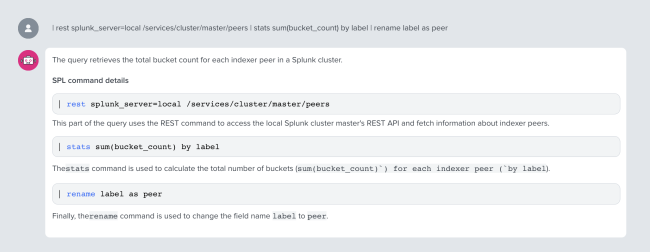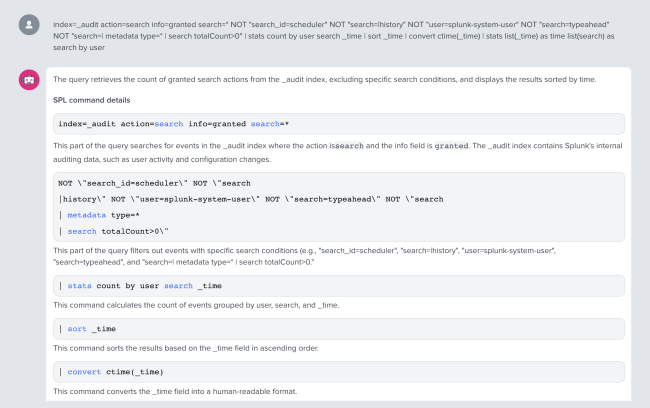Using the Splunk AI Assistant
The Splunk AI Assistant uses Natural Language Processing (NLP) to help users gain familiarity and confidence when using the Splunk Search Processing Language (SPL). You can enter a search you want to make in plain English and have that translated into a usable SPL search, or paste an SPL search and have that translated into plain English.
Version compatibility
The Splunk AI Assistant relies on the Python for Scientific Computing (PSC) add-on. See the following table for the compatible combinations of the Splunk AI Assistant, the PSC add-on, and the Splunk platform:
| Splunk AI Assistant version | PSC version | Splunk platform version |
|---|---|---|
| 0.2.3 | 4.0.0 or higher | Splunk Enterprise 9.0.0 or higher or Splunk Cloud Platform |
| 0.2.2 | 4.0.0 or higher | Splunk Enterprise 9.0.0 or higher or Splunk Cloud Platform |
Accessing and installing the app
The Splunk AI Assistant is offered as a preview. This version is accessible only to registered users through the Splunk Voice of the Customer (VOC) program page. See, Splunk AI Assistant (Preview). to find more information and access the download.
Install the app on the search head only. You can install the app using your browser. You aren't required to download the app using the command line interface (CLI).
- For Splunk Cloud, Platform see Install apps on your Splunk Cloud Platform deployment.
- For customer managed deployments, see Install an add-on in a single-instance Splunk Enterprise deployment or Install an add-on in a distributed Splunk Enterprise deployment.
Installing the PSC add-on
The Splunk AI Assistant relies on the Python for Scientific Computing (PSC) add-on, version 4.0.0 or higher.
The Python for Scientific Computing (PSC) add-on is a free app from Splunkbase. Choose the appropriate operating system version of the PSC add-on for your environment:
On some Windows installations, installing PSC through the Splunk Manage Apps user interface results in an error. This error is usually benign and you can ignore it. In some cases, you might need to manually unpack the package in the apps directory to get past the error.
PSC version 4.0.0 upload limit
The installer for version 4.0.0 in particular of the PSC add-on is bigger than the default upload limit for Splunk Web. Higher versions of PSC do not have this issue. To use PSC version 4.0.0, increase the Splunk Web upload limit to at least 1 GB. Perform the following steps:
- Create a configuration file called $SPLUNK_HOME/etc/system/local/web.conf with the following stanza:
[settings] max_upload_size = 1024
- Restart the Splunk platform from the toolbar. Select Settings > Server controls and click Restart Splunk.
The app includes the following pages:
| Page name | Description |
|---|---|
| Chat | Write SPL tab: Use the field to input plain English to translate into SPL. |
| Explain SPL tab: Use the field to paste an SPL search to translate into plain English. | |
| Usage guidelines | Review high-level guidelines for using the Splunk AI Assistant. |
| Settings | Choose to opt-in and share your anonymized data to help improve app development. You are opted-out by default. To learn more, see Share data in the Splunk AI Assistant. |
Usage guidelines for creating SPL searches from plain English
On the Write SPL tab, you can input a search in plain English for translation into an SPL search. As a best practice, follow these guidelines when composing your plain English search:
| Guideline | Good example | Bad example |
|---|---|---|
Ensure that you input the correct names of your indexes, sources, source types, and fields. Say that you have a field named ip_address and you want to find the most common IP address.
|
Show me the most common ip_address
|
Show me the most common IP Address
|
| Be as descriptive as possible with your plain English query. | search source tutorialdata* and create a time series chart of event count
|
create a timechart of IP Addresses
|
| Compose your plain English search as programmatically as possible. This is especially necessary for longer tasks involving multiple components. | search source tutorialdata* and sort the first 100 results in descending order of the "host" field and then by the clientip value in ascending order
|
sort tutorialdata and give me the first 100 results sorted by descending host and ascending client IP
|
| You do not need to enter your plain English search as a question. | Show me the most common value of ip_address
|
What is the most common value of ip_address?
|
Usage guidelines for translating existing SPL searches into plain English
On the Explain SPL tab you can copy and paste an SPL search for translation into plain English. As a best practice when pasting in SPL, exclude superfluous text or characters, and only include the SPL search itself.
Example 1
The following is a good example of SPL you can paste into the field.
| rest splunk_server=local /services/cluster/master/peers | stats sum(bucket_count) by label | rename label as peer
This search produces the following results:
Example 2
The following is a good example of SPL you can paste into the field.
index=_audit action=search info=granted search=* NOT "search_id=scheduler" NOT "search=|history" NOT "user=splunk-system-user" NOT "search=typeahead" NOT "search=| metadata type=* | search totalCount>0" | stats count by user search _time | sort _time | convert ctime(_time) | stats list(_time) as time list(search) as search by user
This search produces the following results:
Example 3
The following is a bad example of content for the AI Assistant. This example does not generate good results in the app because it includes words and quotation marks that aren't part of an SPL search.
What is est splunk_server=local /services/cluster/master/peers in SPL?
This search produces the following results:
Example 4
The following is a bad example of content for the AI Assistant. This example does not generate good results in the app because it includes words and quotation marks that aren't part of an SPL search.
Please explain "stats sum(bucket_count) by label"
This search produces the following results:
| About the Splunk AI Assistant | Share data in the Splunk AI Assistant |
This documentation applies to the following versions of Splunk® AI Assistant for SPL: 0.2.3




 Download manual
Download manual
Feedback submitted, thanks!